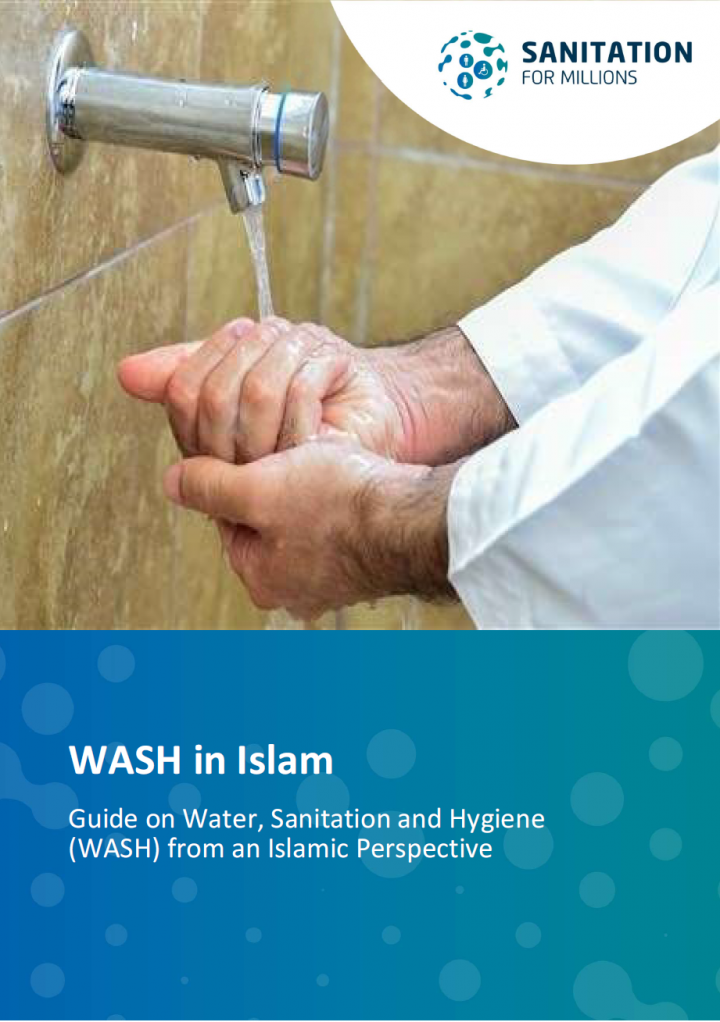Sanitation for Millions - WASH in Islam - Guide on Water, Sanitation and Hygiene (WASH) from an Islamic Perspective
Al-Zoubi, M., El-Amad, W., Sultan, N., Shihadeh, K., Ameen Ghalia, M., Rbeihat, R., Abu Arqoub, H., Btoush, A., Rababeh, F., Zoubi, A., Ababneh, H. (2020)

Published in: 2020
Pages: 49
Publisher:
Deutsche Gesellschaft für Internationale Zusammenarbeit (GIZ) GmbH and Sanitation for Millions Jordan
Author:
Al-Zoubi, M., El-Amad, W., Sultan, N., Shihadeh, K., Ameen Ghalia, M., Rbeihat, R., Abu Arqoub, H., Btoush, A., Rababeh, F., Zoubi, A., Ababneh, H.
Uploaded by:
SuSanA Admin
Partner profile:
Deutsche Gesellschaft für Internationale Zusammenarbeit (GIZ) GmbH
4563 Views
168 Downloads
Islam has paid considerable attention to the personal hygiene of the individual, the general cleanliness of the community and the surrounding environment. The Holy Qur’an and the Noble Sunnah of the Prophet are full of sharia evidences prompting this, and it is explicitly called for when God says, “and your clothing purify”. This focus on hygiene is not limited to preaching and encouragement only, but goes far beyond this in form of enacting sharia provisions and clarifying ways and requirements relevant to hygiene in many aspects, among these:
First: Personal hygiene; represented by the cleanliness of the body and the clothes.
Second: Public hygiene represented by cleaning homes, roads, mosques, public parks and places of study, work, and the environment. This includes best practices on how to use water efficiently while maintaining hygiene.
The impact of hygiene´s rank in Islam has been clear through the early Muslim society´s keenness to follow optimal behaviors and practices relevant to hygiene in all private and public affairs. There are many shining examples in this field set by the conduct of the Prophet Mohammad, peace be upon him.
Despite the lifestyle changes occurring throughout the ages, concepts and basic principles related to hygiene behaviors and public health remain the same in principle. Every optimal practice and hygiene behavior that is recommended by sharia scholars today has its origin stipulated within the Sharia evidences in the Holy Quran and the Sunnah of the Prophet, as well as within the biography of the four rightly guided Caliphs2, and legal opinions by scholars.
Bibliographic information
Al-Zoubi, M., El-Amad, W., Sultan, N., Shihadeh, K., Ameen Ghalia, M., Rbeihat, R., Abu Arqoub, H., Btoush, A., Rababeh, F., Zoubi, A., Ababneh, H. (2020). Sanitation for Millions - WASH in Islam - Guide on Water, Sanitation and Hygiene (WASH) from an Islamic Perspective. Deutsche Gesellschaft für Internationale Zusammenarbeit (GIZ) GmbH and Sanitation for Millions Jordan
Filter tags
Educators English Middle East & North Africa Politicians and local decision makers Practitioners















